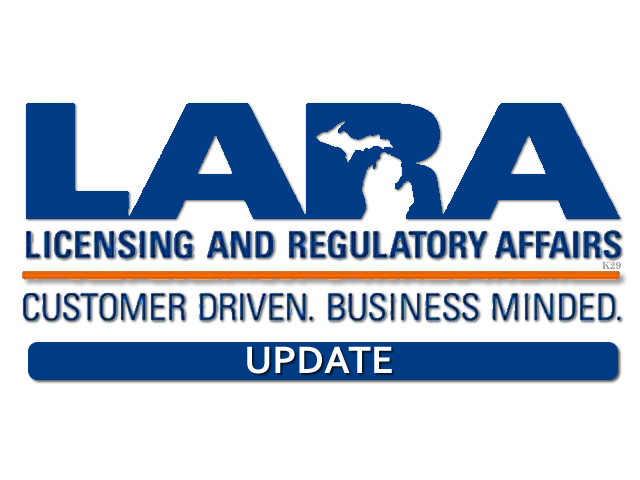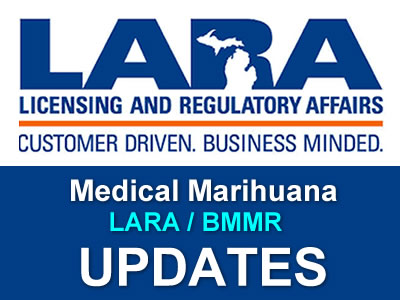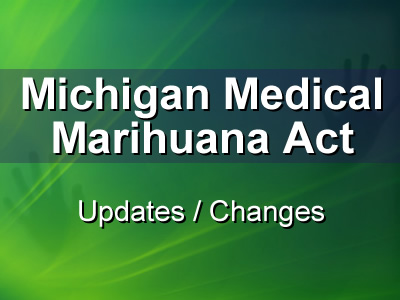
Jun 1, 2018 | Blog, News
LARA Extends June 15th Deadline for Medical Marihuana License Applicants
May 30, 2018 – The Dept. of Licensing and Regulatory Affairs (LARA) has issued new emergency administrative rules to continue the implementation of the Medical Marihuana Facilities Licensing Act (MMFLA). To help ensure the continued protection of medical marihuana patients, under the new rules, proposed medical marihuana facilities that would otherwise require a state operating license under the MMFLA may continue to operate with local approval until September 15, 2018 without impacting the applicant’s eligibility for licensure.
“Extending the deadline to September 15th will make sure that this law is implemented correctly and assure that potential licensees are thoroughly reviewed. It is important that we ensure that medical marihuana patients have continued access to their medicine,” said LARA Director Shelly Edgerton.
Applicants who turned in their state application by the February 15th deadline – and are making a good-faith effort to become licensed – had faced a deadline of June 15, 2018 to shut down or risk continued activity being considered an impediment to licensure by the Medical Marihuana Licensing Board (MMLB). This 92-day extension will allow the bureau and the board enough time to investigate and authorize facility operator licenses in order to make sure that access to medical marihuana is maintained.
The new emergency rules also include clarifying language regarding safety testing standards that LARA has previously disseminated through technical advisories.
Signed by Gov. Rick Snyder and effective today, these rules will remain in effect for six months.
It is important for applicants to remember that LARA’s emergency administrative rules require those operating under the temporary operation rule (number 19) to cease operation if they have not been issued a license by September 15, 2018, as any operation after that date is considered unlicensed activity.
Ultimately, licensure decisions will be made by the members of the MMLB, who may choose to consider unlicensed activity as part of the licensing criteria when deliberating on the overall application. Until a license is received from the state, the operation of a proposed medical marihuana facility should be considered a business risk by the operator. Noncompliance will be grounds for disciplinary action and referral to law enforcement for unlicensed activity.

Jun 1, 2018 | Blog, Michigan Medical Marijuana Act
When it comes to medical marijuana, what are Michigan’s lawmakers smoking?
Larry Gabriel May 30, 2018
The Michigan Medical Marihuana Licensing system is evolving into a confusing, mind-blowing regulatory nightmare.
Medical marijuana has been legal in this state for 10 years, and the Medical Marihuana Facilities Licensing Act was passed in September 2016. Now, consider that, after all that time, in a couple of weeks (on June 15), according to the Bureau of Medical Marihuana Regulation (BMMR), any currently operating marijuana facility must have a state license in order to legally stay open.
That’s fine, except the state hasn’t given out any licenses as of this writing.
According to David Harns, public information officer with the state Bureau of Licensing and Regulatory Affairs (LARA), “We expect to be handing out licenses within the next few weeks. Most likely at the June 11 meeting [of the Medical Marihuana Licensing Board].”
Talk about running things up until the last minute!
The BMMR — could this be an acronym for bummer? — created this whole scenario by setting the deadlines and setting up an application process that is so cumbersome to all involved that none of this can get done by the self-imposed deadline.
That means dispensaries, provisioning centers, or whatever you want to call them, may or may not have licenses to operate come June 15. Not only that, any licenses handed out may go to facilities that are not currently open. That would create a huge gap in service to patients while newly licensed facilities ramp up their operations.
If the state were interested in patients having uninterrupted access to medication, it might make sense to move the deadline back a little. After all, it is the BMMR that set up a bureaucracy involving so much red tape that it was impossible for applications to be processed in the allotted time.
According to Harns, the deadline is not moving. And that’s where the real mind-fuck kicks in. Harns says that if already operating facilities are showing a “good faith” effort to become licensed, they don’t need to worry about LARA. A recent advisory from LARA read: “While the ultimate licensure decision is made by the Medical Marihuana Licensing Board, LARA does not currently intend to issue cease and desist letters, or refer to law enforcement” marijuana stores that continue to operate past the deadline.
LARA’s decision not to go after unlicensed stores that are making a good faith effort to become licensed is sensible; it’s like moving the deadline back — by not enforcing it.
But then LARA points out that LARA is not making the decision about who gets licenses. So if you decide to continue operating, the Licensing Board might hold it against you.
“The Licensing Board has ultimate authority,” Harns says. “They may choose to consider unlicensed activity when looking at the licensing criteria.”
Basically LARA is saying that there’s a deadline, but if you don’t adhere to it, we don’t care, but those other people over there who actually make the decision on whether you get a license might care — or they might not.
That’s a hell of an advisory.
Not only is that a confusing pile of hooey, it sets up the possibility for unequal application of the rules. If the Licensing Board can choose to consider that in one case and not in another, then that sets up legal challenges that will last forever. If they couldn’t decide if “unlicensed activity” counts against an applicant after all this time, then the consideration should be thrown out the window.
Even at this late juncture, Harns threw out a lot of “the board may do this” or “the board may do that” scenarios, finishing with, “Those are a lot of mays. I can’t speak definitively for those board members.”
That’s a lot of uncertainty for everybody concerned, especially patients. For instance, once growing licenses get handed out, it is a fact of nature that it takes several months to grow a plant to maturity. Add on some time for transporting and processing and inspecting, and it means that it will probably be 2019 before this whole thing really gets rolling.
Harns points to the caregiver system to keep patients supplied. “That has not changed at all,” he says.
That’s nice. But, first of all, there are a lot of people who thought they were going to grow their own marijuana who have thrown in the towel because getting consistent results and maintaining a constant supply is harder than they thought it would be. Second, anyone that needs oil for seizures or cancer treatments depends on a much more sophisticated process than the average caregiver can handle. And, third, this stuff has been legal here for a decade, dude — get it together and roll out the system!
The whole thing stinks of a state government that has not made a good faith effort to make this system work and won’t move forward without watchdogs nipping at their heels. It’s taken an army of activists and lawyers to get things to this point.
It also seems that it’s going to get uglier before it gets better, as we see who will actually get licenses and who will get their dreams smashed on the rocks.
CBD is marijuana
CBD (cannabidiol), one of the many compounds in marijuana, has developed a high profile the past several years due to its usefulness in reducing seizures for epilepsy patients. It’s been marketed by some companies as legal, because it’s extracted from hemp, the strain of cannabis used to make textiles and other products. It’s also been embraced as “the part of marijuana that doesn’t get you high.”
On May 11, LARA put out an advisory that erased any doubt you may have about our state government’s attitude toward CBD. In part, the advisory read: “The possession, purchase, or sale of marihuana or any marihuana product — including CBD — must be done in compliance with the MMMA and MMFLA.”
To finish the article click here

May 10, 2018 | Blog, Medical Marihuana Review Panel, Medical Marijuana, Michigan Medical Marijuana Act, News
A review panel on Friday 5-4-18 recommended adding 10 new conditions to the list of ailments for approval for medical marijuana use. The recommended additions are…
- Obsessive compulsive disorder
- Arthritis
- Rheumatoid arthritis
- Spinal cord injury
- Inflammatory bowel disease
- Ulcerative colitis
- Parkinson’s
- Tourette Syndrome
- Autism
- Chronic pain
A Michigan regulator will consider an advisory board’s recommendation to add autism and other conditions to a list of allowable medical conditions for the use of marijuana.
Shelly Edgerton who is The Department of Licensing and Regulatory Affairs Director has until July 10, 2018 to make a decision on nine of the recommendations and until Aug. 6 to make a decision on another.
A previous director in 2015 rejected a recommendation to allow marijuana use for autism.
Marijuana is allowed to relieve the side effects of cancer and other conditions. Only post-traumatic stress disorder has been added since 2008.




